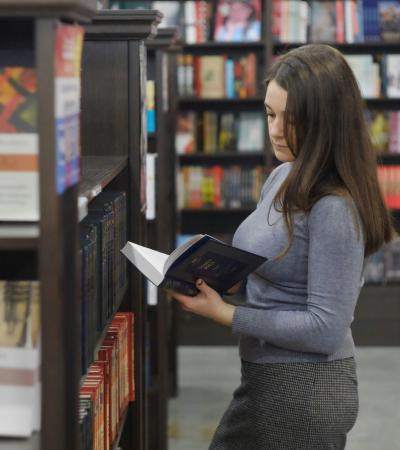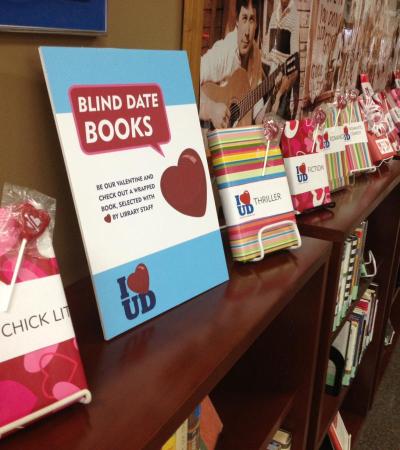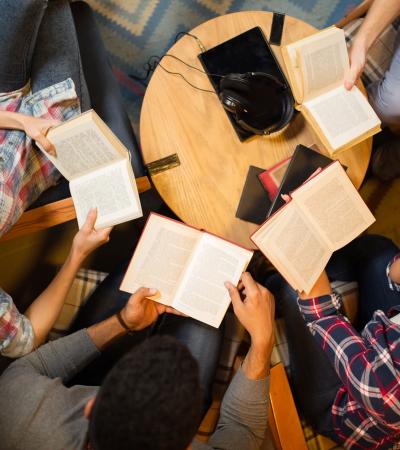In this adult evening program, participants learn about six spectacular books and sample six amazing local beverages at tasting stations.
Each book is paired with a beverage matched in tone and intensity to the book. Program partners have included wineries, coffee roasters and tea shops.
Titles selected for this program are usually “under-performers” in our community — books that were highly reviewed but haven’t circulated well. After the program, most circulate much better and for an extended period of time: circulation stays elevated on each title for up to two years.
Advanced Planning
Because this event is often held outside of the library, it’s a great program to meet people where they are in the community. We tend to see many new faces.
Contracts and dates are worked out with the vendor about six months in advance. The vendor supplies me with wine/tea/coffee list and tasting notes about two months in advance. I recruit volunteers and select book titles about six weeks before the event. One month before, I assign titles to volunteers to read. Volunteers then prepare their book talks.
Patron registration is required; the registration portal opens on our website about three weeks before the event. There are usually a few cancellations in the days before the program, so I leave time to call people on the wait list.
Marketing
We promote the event via fliers in the library and out in the community, website content, a Facebook post and a press release. When offered as part of our summer reading program, it is also included in the multi-page booklet that is delivered to every home in the county.
Typically each 90-minute program accommodates about 50 people. After offering the program once or twice a year for a few years, by 2018 the wait list was long enough to fill an entire additional program. So in 2019 we revamped the program set-up slightly to allow for 100 participants — and we still had people on the wait list!
We are now organizing our tenth Books & Libations, and we no longer market this as widely as we used to. About half the attendees are repeats, but many have heard of the program by word of mouth.
Budgeting
The library pays the vendor for use of their space or staff time, but beverages are supplied for free. All iterations of this program have contracted for $300 or less.
On occasion we have held the program in the library, serving non-alcoholic drinks or other treats, such as mini-cupcakes. That tends to cost a little bit less.
Day-of-event Activity
Set-up at any location requires a single entry point so we can check in attendees. Six stations are needed; these can be high-top tables, circles of chairs, an open area for standing or any other arrangement. The stations should be far enough apart that conversation from one does not drown out conversation in another.
Six volunteer readers are needed (recruited about two months before, with books assigned four weeks before the program). The vendor is asked to provide six volunteers or staff to pour, as well.
If staffing permits, it’s best to have two library staff present. This allows for quick registration and dividing the attendees into groups at the top of the program, as well as smooth transitions between stations. I have run this program with only one staff member, with only five volunteers (and I presented the sixth book) and with fewer than six vendor staff (it can be done with as few as three, who move back and forth between two tables), but if volunteers can be arranged, it’s much more comfortable and less hectic for all involved.
Program Execution
Upon entry, staff assigns people to small groups (8 to 11 each). All six groups start simultaneously, one at each of the six stations.
The vendor staff/volunteer at each station offers one or two ounces of their assigned beverage. The vendor volunteer gives a three-minute introduction, tasting notes, comparisons, origins, etc. Then the library volunteer gives a three-minute book talk about the title assigned to that station.
When groups have been at their stations for 10 minutes, there is a two-minute warning. After 12 minutes at each station, staff members direct attendees to rotate to the next station. (Rotation could be done by leaving groups in one location and moving presenters, but both vendors and attendees prefer that participants see all of the spaces.) The process is repeated until all six groups have rotated through all six stations.
Now that we are offering the program twice in one night to accommodate 100 registrants, the process is still the same. We offer two sign-up times about two hours apart. Patrons sign up for only one time.
Volunteers and patrons alike wish for more time at each station to talk, but then the program would be unwieldy in length — it’s 90 minutes as it is.
Advice
The library has been able to partner with several non-traditional vendors (wineries, coffee roasters, tea shops) and have informal introductory conversations with several others (bars, kombucha brewers, bakeries). Previous vendor partners have become strong library supporters.
Each vendor partner has appreciated the promotion that the program brings; after the program, attendees frequently make purchases and then turn into repeat customers. As each program is wrapping up, library staff receive questions and comments about other library services from attendees. We frequently sign up people for library cards or the summer reading program, field questions about eBooks and direct questions about other library services.
No formal evaluation has been completed for this program series. It has been offered eight times in four years with two planned for 2020, and informal response from the community and from vendors has been excellent.
This program takes a significant amount of staff time to organize, especially the first time. It is flexible in that you can work with any vendor and select books around any topic or theme, or around no particular commonality, as best fits your community. There are other ways you could organize the registration or the groups, but attendees seem to most appreciate the informal atmosphere the small-group structure provides.




